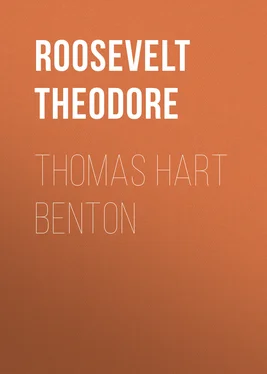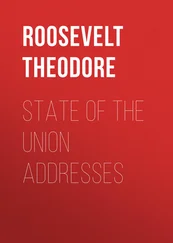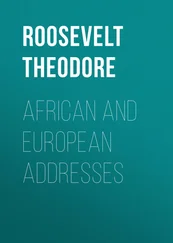Theodore Roosevelt - Thomas Hart Benton
Здесь есть возможность читать онлайн «Theodore Roosevelt - Thomas Hart Benton» — ознакомительный отрывок электронной книги совершенно бесплатно, а после прочтения отрывка купить полную версию. В некоторых случаях можно слушать аудио, скачать через торрент в формате fb2 и присутствует краткое содержание. Жанр: foreign_prose, История, foreign_edu, foreign_antique, на английском языке. Описание произведения, (предисловие) а так же отзывы посетителей доступны на портале библиотеки ЛибКат.
- Название:Thomas Hart Benton
- Автор:
- Жанр:
- Год:неизвестен
- ISBN:нет данных
- Рейтинг книги:4 / 5. Голосов: 1
-
Избранное:Добавить в избранное
- Отзывы:
-
Ваша оценка:
- 80
- 1
- 2
- 3
- 4
- 5
Thomas Hart Benton: краткое содержание, описание и аннотация
Предлагаем к чтению аннотацию, описание, краткое содержание или предисловие (зависит от того, что написал сам автор книги «Thomas Hart Benton»). Если вы не нашли необходимую информацию о книге — напишите в комментариях, мы постараемся отыскать её.
Thomas Hart Benton — читать онлайн ознакомительный отрывок
Ниже представлен текст книги, разбитый по страницам. Система сохранения места последней прочитанной страницы, позволяет с удобством читать онлайн бесплатно книгу «Thomas Hart Benton», без необходимости каждый раз заново искать на чём Вы остановились. Поставьте закладку, и сможете в любой момент перейти на страницу, на которой закончили чтение.
Интервал:
Закладка:
It was in reference to this matter of admitting Missouri that the slavery question for the first time made its appearance in national politics, where it threw everything into confusion and for the moment overshadowed all else; though it vanished almost as quickly as it had appeared, and did not again come to the front for several years. The Northerners, as a whole, desiring to "restrict" the growth of slavery and the slave-power, demanded that Missouri, before being admitted as a state, should abolish slavery within her boundaries. The South was equally determined that she should be admitted as a slave state; and for the first time the politicians of the country divided on geographical rather than on party lines, though the division proved but temporary, and was of but little interest except as foreshadowing what was to come a score of years later. Even within the territory itself the same contest was carried on with the violence bred by political conflicts in frontier states, there being a very respectable "restriction" party, which favored abolition. Benton was himself a slave-holder, and as the question was in no way one between the East and the West, or between the Union as a whole and any part of it, he naturally gave full swing to his Southern feelings, and entered with tremendous vigor into the contest on the anti-restriction side. So successful were his efforts, and so great was the majority of the Missourians who sympathized with him, that the restrictionists were completely routed and succeeded in electing but one delegate to the constitutional convention. In Congress the matter was finally settled by the passage of the famous Missouri Compromise bill, a measure Southern in its origin, but approved at the time by many if not most Northerners, and disapproved by not a few Southerners. Benton heartily believed in it, announcing somewhat vaguely that he was "equally opposed to slavery agitation and to slavery extension." By its terms Missouri was admitted as a slave state, while slavery was abolished in all the rest of the old province of Louisiana lying north and west of it and north of the parallel of 36° 30'. Owing to an objectionable clause in its Constitution, the admission was not fully completed until 1821, and then only through the instrumentality of Henry Clay. But Benton took his seat immediately, and entered on his thirty years' of service in the United States Senate. His appearance in national politics was thus coincident with the appearance of the question which, it is true, almost immediately sank out of sight for a period of fifteen years, but which then reappeared to stay for good and to become of progressively absorbing importance, until, combining itself with the still greater question of national unity, it dwarfed all other issues, cleft the West as well as the East asunder, and, as one of its minor results, brought about the political downfall of Benton himself and of his whole school in what were called the Border States.
Before entering the Senate, Benton did something which well illustrates his peculiar uprightness, and the care which he took to keep his public acts free from the least suspicion of improper influence. When he was at the bar in St. Louis, real estate litigation was much the most important branch of legal business. The condition of Missouri land-titles was very mixed, since many of them were based upon the thousands of "concessions" of land made by the old French and Spanish governments, which had been ratified by Congress, but subject to certain conditions which the Creole inhabitants, being ignorant and lawless, had generally failed to fulfill. By an act of Congress these inchoate claims were to be brought before the United States recorder of land titles; and the Missouri bar were divided as to what action should be taken on them, the majority insisting that they should be held void, while Benton headed the opposite party, which was averse to forfeiting property on technical grounds, and advocated the confirmation of every honest claim. Further and important legislation was needed to provide for these claims. Benton, being much the most influential member of the bar who had advocated the confirmation of the claims, and being so able, honest, and energetic, was the favorite counsel of the claimants, and had hundreds of their titles under his professional charge. Of course in such cases the compensation of the lawyer depended solely upon his success; and success to Benton would have meant wealth. Nevertheless, and though his action was greatly to his own pecuniary hurt, the first thing he did when elected senator was to convene his clients, and tell them that henceforth he could have nothing more to do, as their attorney, with the prosecution of their claims, giving as his reason that their success largely depended upon the action of Congress, of which he was now himself a member, so that he was bound to consult, not any private interest, but the good of the community as a whole. He even refused to designate his successor in the causes, saying that he was determined not only to be quite unbiased in acting upon the subject of these claims as senator, but not to have, nor to be suspected of having, any personal interest in the fate of any of them. Many a modern statesman might most profitably copy his sensitiveness.
CHAPTER III
EARLY YEARS IN THE SENATE
When Benton took his seat in the United States Senate, Monroe, the last president of the great house of Virginia, was about beginning his second term. He was a courteous, high-bred gentleman, of no especial ability, but well fitted to act as presidential figure-head during the politically quiet years of that era of good feeling which lasted from 1816 till 1824. The Federalist party, after its conduct during the war, had vanished into well-deserved obscurity, and though influences of various sorts were working most powerfully to split the dominant and all-embracing Democracy into factional fragments, these movements had not yet come to a head.
The slavery question, it cannot be too often said, was as yet of little or no political consequence. The violent excitement over the admission of Missouri had subsided as quickly as it had arisen; and though the Compromise bill was of immense importance in itself, and still more as giving a hint of what was to come, it must be remembered that its effect upon general politics, during the years immediately succeeding its passage, was slight. Later on, the slavery question became of such paramount consequence, and so completely identified with the movement for the dissolution of the Union, that it seems impossible for even the best of recent historians of American politics to understand that such was not the case at this time. One writer of note even goes so far as to state that "From the night of March 2, 1820, party history is made up without interruption or break of the development of geographical [the context shows this to mean Northern and Southern] parties." There is very little ground for such a sweeping assertion until a considerable time after the date indicated; indeed, it was more than ten years later before any symptom of the development spoken of became at all marked. Until then, parties divided even less on geographical lines than had been the case earlier, during the last years of the existence of the Federalists; and what little division there was had no reference to slavery. Nor was it till nearly a score of years after the passage of the Missouri Compromise bill that the separatist spirit began to identify itself for good with the idea of the maintenance of slavery. Previously to that there had been outbursts of separatist feeling in different states, but always due to entirely different causes. Georgia flared up in hot defiance of the federal government, when the latter rubbed against her on the question of removing the Cherokees from within her borders. But her having negro slaves did not affect her feelings in the least, and her attitude was just such as any Western state with Indians on its frontier is now apt to assume so far as it dares,—such an attitude as Arizona, for example, would at this moment take in reference to the Apaches, if she were able. Slavery was doubtless remotely one of the irritating causes that combined to work South Carolina up to a fever heat of insanity over the nullification excitement. But in its immediate origin nullification arose from the outcry against the protective tariff, and it is almost as unfair to ascribe it in any way to the influence of slavery as it would be to assign a similar cause for the Virginia and Kentucky resolutions of 1798, or to say that the absence of slavery was the reason for the abortively disloyal agitation in New England, which culminated in the Hartford Convention. The separatist feeling is ingrained in the fibre of our race, and though in itself a most dangerous failing and weakness, is yet merely a perversion and distortion of the defiant and self-reliant independence of spirit which is one of the chief of the race virtues; and slavery was partly the cause and partly merely the occasion of the abnormal growth of the separatist movement in the South. Nor was the tariff question so intimately associated with that of slavery as has been commonly asserted. This might be easily guessed from the fact that the originator and chief advocate of a high tariff himself came from a slave state, and drew many of his warmest supporters from among the slave-holding sugar-planters. Except in the futile discussion over the proposed Panama Congress it was not till Benton's third senatorial term that slavery became of really great weight in politics.
Читать дальшеИнтервал:
Закладка:
Похожие книги на «Thomas Hart Benton»
Представляем Вашему вниманию похожие книги на «Thomas Hart Benton» списком для выбора. Мы отобрали схожую по названию и смыслу литературу в надежде предоставить читателям больше вариантов отыскать новые, интересные, ещё непрочитанные произведения.
Обсуждение, отзывы о книге «Thomas Hart Benton» и просто собственные мнения читателей. Оставьте ваши комментарии, напишите, что Вы думаете о произведении, его смысле или главных героях. Укажите что конкретно понравилось, а что нет, и почему Вы так считаете.












